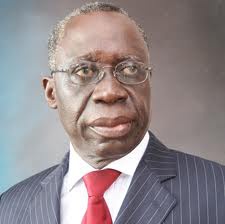- Home - News
- TWI News | TV
- Polls
- Year In Review
- News Archive
- Crime & Punishment
- Politics
- Regional
- Editorial
- Health
- Ghanaians Abroad
- Tabloid
- Africa
- Religion
- Election 2020
- Coronavirus
- News Videos | TV
- Photo Archives
- News Headlines
- Press Release
General News of Monday, 23 July 2012
Source: GNA
Osafo Maafo grilled over Woyome's case

Lawyers of Alfred Agbesi Woyome, the businessman involved in the GH¢51.2 million judgment debt payment, on Monday grilled for a long time Mr. Yaw Osafo Maafo, former Minister of Education and Sports during the trial at the Accra Fast Track High Court.
Cross-examined by Mr. Osafo Buabeng, a member of Woyome's legal team, Mr. Osafo Maafo said VAMED and M-Powapak were provided a turn-key project by which they had to source for funding and build the Sekondi and Tamale stadia.
Woyome is on trial for defrauding by false pretences and causing financial loss to the State. He has pleaded not guilty and granted a GH¢20 million bail with three sureties to be justified.
Mr. Osafo Buabeng, who tendered in evidence six different documents, however, insisted that the former New Patriotic Party (NPP) administration bypassed the procurement procedures to award a new contract to a Chinese company, Shangai.
He said VAMED and M-Powapak were in line to be awarded the contract but the then government stampeded the process and brought in Shangai.
Defence counsel disputed the claim by Mr. Osafo Maafo that the Government by awarding the contract to the Chinese company saved the country about $100 million.
Mr. Osafo Maafo, however, insisted Cabinet under the NPP Administration took the decision in the best interest of the country.
He said VAMED and M-Powapak failed to meet the condition precedent of providing funds for the project, which forced government to look elsewhere, and government wrote to VAMED and M-Power Pack to terminate the tender process and not contract, because there was no contract to begin with.
Mr. Osafo Maafo explained that Waterville, which the accused claimed was part of VAMED and M-Powapak for the bidding process was nowhere in the tendering process with regard to the Sekondi and Tamale stadia.
He said even though the Government dealt with Waterville it was only in respect of the rehabilitation of the Accra and Kumasi stadia.
Mr. Justice John Ajet-Nassam, the trial judge, subsequently adjourned the case to July 25.
The prosecution's case was that, sometime in January 2005, the Government invited bids for the rehabilitation of the Ohene Djan and Baba Yara Sports stadia and the construction of two stadia at Sekondi-Takoradi and Tamale.
At the end of the bidding process, some companies were short-listed and invited to submit proposals for the projects and among them were M-Powapak Gmb/VAMED Gmbh and Company.
At the end of the evaluation process, the Finance and Evaluation Committee declared the financial proposals of M-powapak /Vamed Engineering as the most responsive and recommended them to the Central Tender Review Board.
However, before the Board could receive final approval, the Government terminated the process.
Meanwhile, in the course of the tendering process, Vamed Engineering assigned its rights and responsibilities to Waterville Holding (BVI) Ltd.
After termination of the tendering process, Waterville protested and entered into a Memorandum of Understanding (MoU) with the Government to commence rehabilitation works on the Accra and El-Wak stadia.
The MoU signed on November 30, 2005, required Waterville to engineer funding for the project on behalf of the Government from the Bank of Austria Creditanstalt AG, guaranteed by the World Bank’s Multilateral Investment Guarantee Agency.
The company arranged bridge financing and subsequent to the MoU, Waterville was authorised by the Ministry of Youth and Sports to move to the site and start work pending the signing of a formal contract.
On December 19, 2005, Waterville engaged M-powapak, led by Woyome, to provide it with financial engineering services in respect of the projects.
A formal contract for the rehabilitation of Ohene Djan and El-Wak stadia was entered into by the Government and Waterville Holding Limited on April 26, 2006.
However, before the contract could become effective, the Government terminated same due to Waterville’s inability to engineer funding for the project as contained in the MoU, which formed a condition precedent to the contract.
Waterville, who initially protested against the termination, eventually accepted the move and proceeded to claim monies for the initial works done under the MoU.
The Government paid a substantial amount of Waterville's claims out of which the company fully paid M-powapak, represented by the accused, for the financial engineering services rendered under the contract.
Payment to the accused for his services was duly acknowledged by him in a termination agreement dated 25th November 2006, which brought the relationship between them to an end.
Sometime in August 2009, however, the accused having received all monies due him under the financial engineering services rendered to Waterville, took advantage of the change in Government and falsely represented to government officials that the Government owed him money for financial engineering services rendered to it under the contract with Waterville.
In his claim to government officials, the accused who had no contract with government claimed that as part of the financial engineering services rendered, he managed to arrange €1,106,470,587 for the Government through the Bank Austria Creditans, out of which he claimed he was entitled to two per cent as financial engineering fees.
Investigations however revealed that there were no such funds made available for the benefit of the country by Bank Austria as claimed by the accused.
Further investigations revealed that the accused had no contract with the Government to provide any services.
The only arrangement on financial engineering services the accused had was with Waterville Holdings Ltd, which services had been fully paid for and acknowledged by the accused in a termination agreement.**










